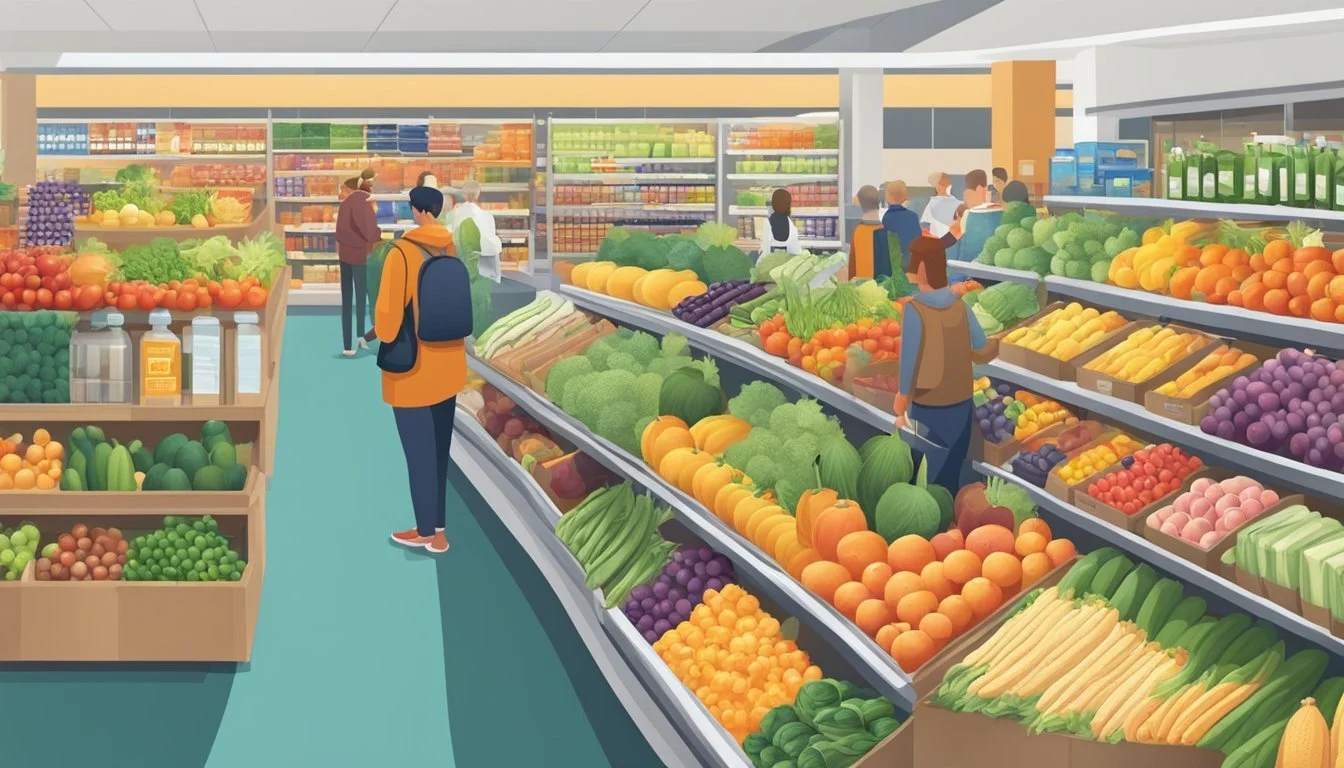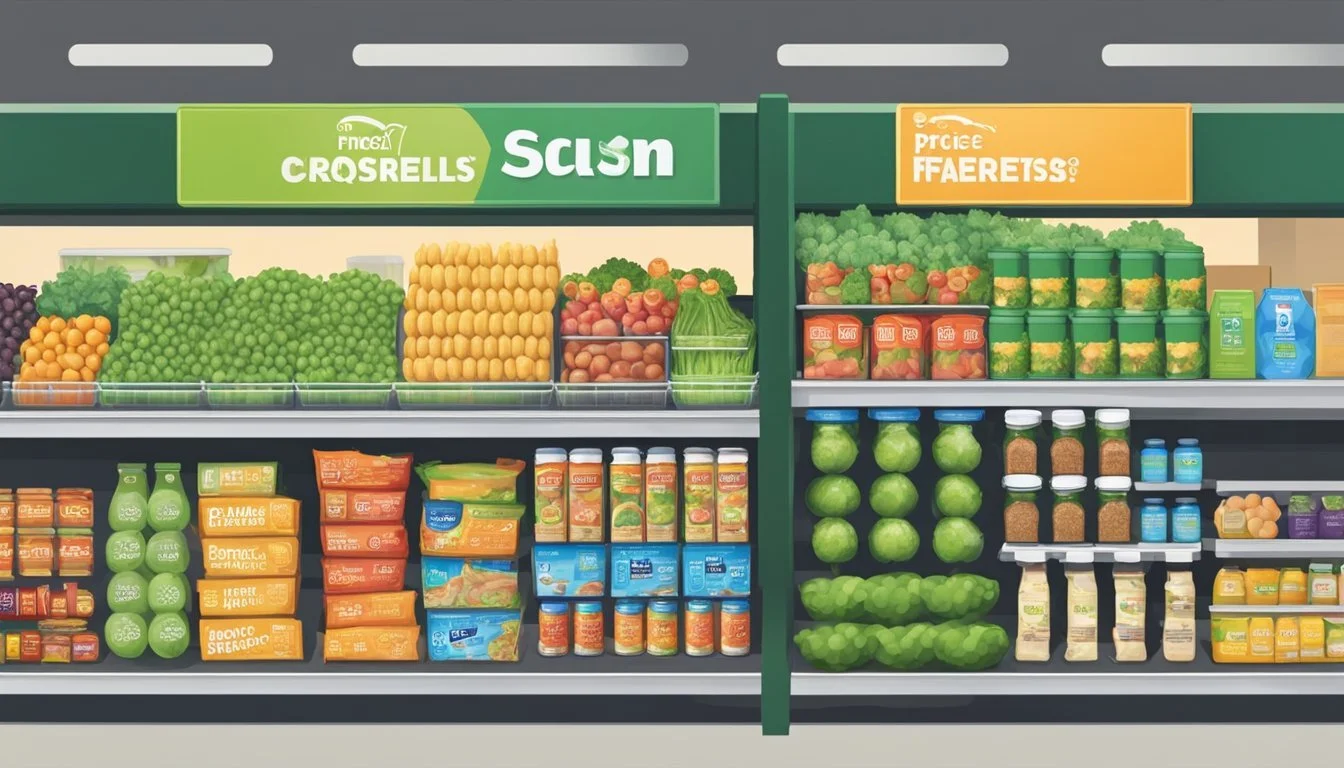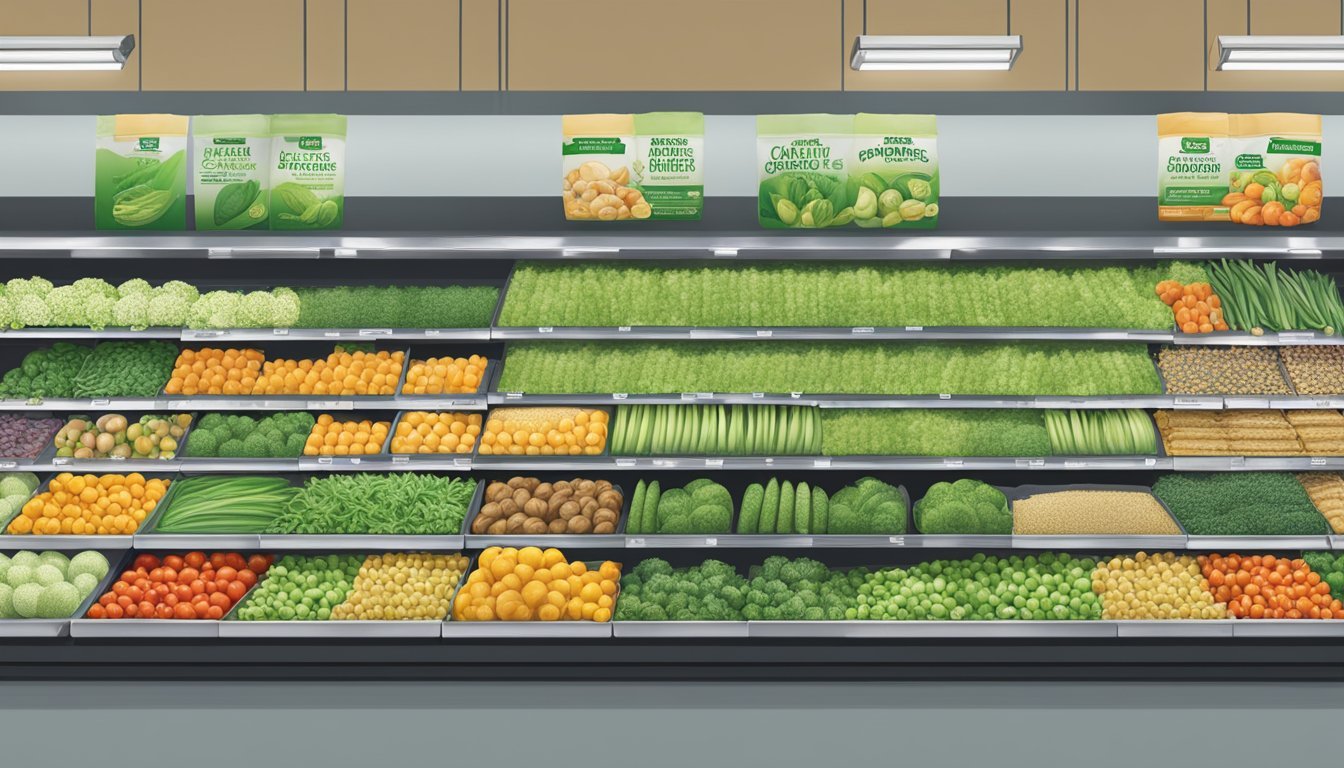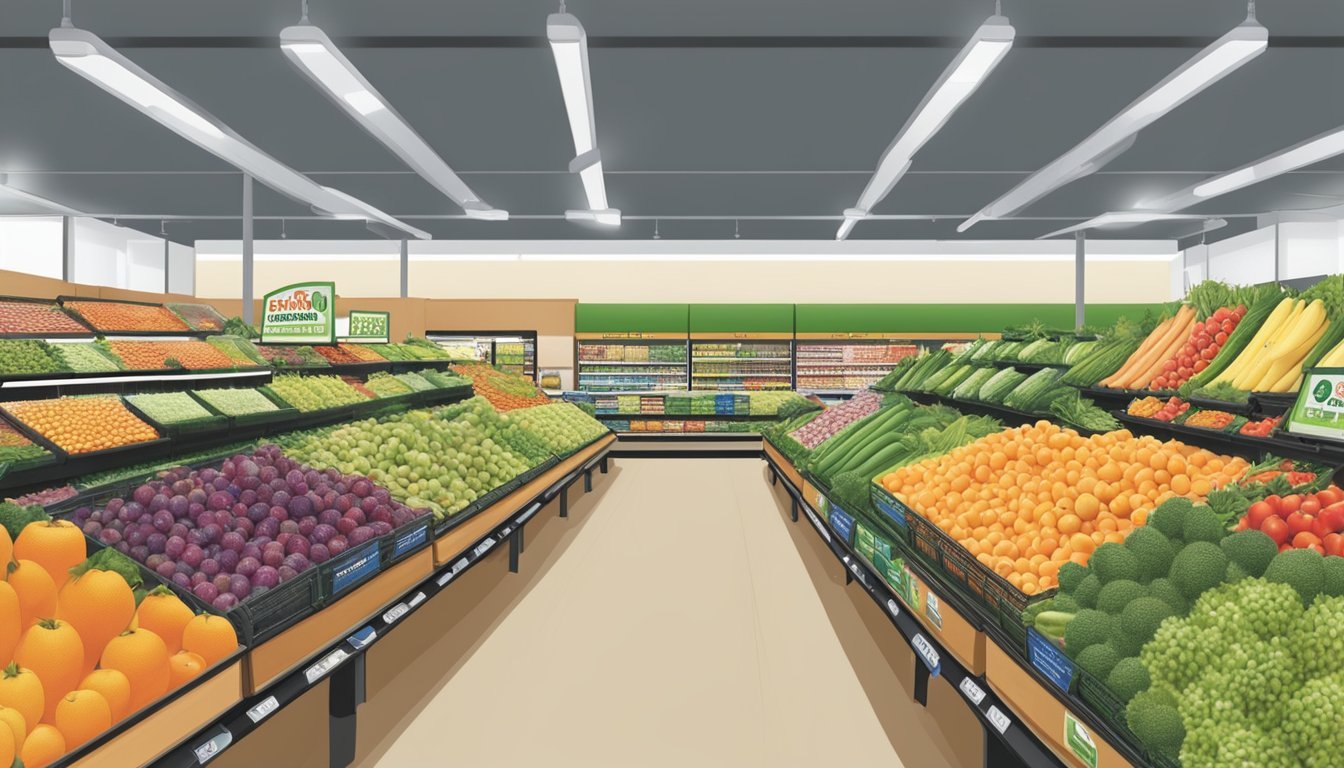Sam's Club vs Sprouts Farmers Market
Comparing Shopping Experiences and Value
Part of Our Grocery Store Guide with Details on Sam's Club and Sprouts Farmers Market
When it comes to grocery shopping, consumers are faced with numerous choices, each offering a unique shopping experience, product selection, and pricing strategy. Among the vast array of options, Sam's Club and Sprouts Farmers Market emerge as two contrasting contenders in the marketplace. Sam's Club, a membership-based warehouse club, is known for its bulk items, competitive pricing, and wide-ranging merchandise that includes groceries and electronics, catering to customers looking for value and a one-stop-shop experience.
Conversely, Sprouts Farmers Market finds its niche in the health-conscious segment, offering an extensive variety of fresh, organic, and natural foods. Drawing inspiration from traditional farmers markets, Sprouts emphasizes a farm-fresh produce selection and a unique assortment of healthy and specialty foods. While the setting lacks the electronics and household goods found in Sam's Club, it appeals to shoppers who prioritize wellness and sustainable living.
Choosing between the two stores will largely depend on individual shopping preferences, lifestyle, and budget. Sam’s Club's consumables are usually in larger quantities and offered at lower per-unit prices, which can be ideal for large families or those looking to stock up and save. Sprouts, on the other hand, is more suited for customers seeking specialized products, particularly those tailored to dietary preferences like vegan, gluten-free, or non-GMO diets. The decision on the superior grocery store cannot be universally applied, as it's truly in the eye of the beholder—or better yet, the consumer.
Overview of Sam's Club and Sprouts Farmers Market
In the landscape of American retail, Sam's Club and Sprouts Farmers Market offer distinct grocery shopping experiences catering to different consumer needs with their unique histories, business models, and target markets.
History and Background
Sam's Club, a division of Walmart Inc., opened its doors in 1983, named after Walmart's founder, Sam Walton. It operates on a membership warehouse club model where customers pay an annual fee to access a wide range of products at discounted prices, including bulk groceries, electronics, and home goods.
Sprouts Farmers Market, founded in 2002, has built its reputation on offering fresh, natural, and organic products at affordable prices. With a focus on health and wellness, Sprouts presents a supermarket experience that emphasizes fresh produce, bulk foods, vitamins, and supplements, catering to health-conscious consumers.
Business Models
Sam's Club's business model is based on a bulk-sale, membership-only warehouse style. It garners revenue both from membership fees and from the sale of goods. The warehouse model allows for products to be sold in larger quantities at lower per-unit prices.
In contrast, Sprouts Farmers Market operates on a supermarket model, oriented toward offering organic and natural food items. Sprouts does not require membership and maintains a layout similar to traditional supermarkets but with an added emphasis on produce and healthy living.
Target Market
The target market for Sam's Club includes both individual shoppers and small business owners looking for bulk items and general merchandise at competitive prices. The nexus of its target demographic hinges on customers driven by the value of volume purchasing.
Sprouts Farmers Market focuses on health-conscious individuals who prioritize organic and natural food options. These customers are typically willing to invest in higher-quality, healthier food choices, but still appreciate the value and competitive pricing that Sprouts offers.
Comparing Shopping Experience
When considering Sam's Club versus Sprouts Farmers Market, key differentiators in the shopping experience arise from the store layout, product variety, and level of customer service.
Store Layout
Sam's Club operates on a warehouse model, offering bulk items displayed on pallets in a large, open floorplan. Shoppers can expect to navigate through wide aisles designed for volume and efficiency. In contrast, Sprouts Farmers Market is reminiscent of an open marketplace, with a more traditional grocery layout. Sprouts focuses on natural and organic products, with an emphasis on fresh produce, often centrally located as a store highlight.
Product Variety
Sam's Club is known for its extensive selection, primarily in bulk sizes, which includes a wide range of groceries, electronics, and household goods. They provide a one-stop-shop convenience for shoppers looking to purchase items in large quantities. Sprouts, on the other hand, specializes in healthy and organic options, featuring a diverse assortment of natural foods and products, including unique and locally-sourced goods that cater to specific dietary needs.
Customer Service
Customer service at Sam’s Club can vary due to the sheer volume of customers and the self-service nature of a warehouse club. Sam's Club offers member services and self-checkout options to streamline the shopping experience. Sprouts Farmers Market often excels in a more personalized shopping experience, with knowledgeable staff readily available to assist with questions about specialty products, health, and nutrition.
In summary, both retailers offer distinct shopping experiences catering to different customer preferences, whether it's the convenience and selection of bulk purchases at Sam's Club or the specialized and health-conscious offerings at Sprouts Farmers Market.
Product Offerings
When comparing the product offerings of Sam's Club and Sprouts Farmers Market, customers will find distinct differences in private labels, organic and natural foods, and fresh produce. Sam's Club operates with a bulk-purchase model while Sprouts offers a health-oriented shopping experience.
Private Labels
Sam's Club offers a range of private label products under the Member's Mark brand. These products typically represent value and are designed to compete with national brands on quality and price. On the other hand, Sprouts Farmers Market's private label products focus on health-conscious consumers, offering natural and organic options that align with their brand identity.
Member's Mark: Bulk-sized, cost-effective products across various categories.
Sprouts Brand: Health-oriented products with an emphasis on natural ingredients.
Organic and Natural Foods
Sprouts Farmers Market specializes in organic and natural foods, featuring an extensive selection that caters to those who prioritize health and wellness. It’s well-regarded for a robust offering, ensuring quality and variety in its organic segment. Sam's Club, while not exclusively focused on organic products, has expanded its inventory to include more organic and natural options in response to consumer demand.
Sprouts: Wide array of organic foods, including pantry staples and snacks.
Sam's Club: Growing selection of organic options among conventional products.
Fresh Produce
Sprouts Farmers Market is known for a farmers market-like produce section, boasting fresh, organic produce and a seasonal assortment reflective of local and regional preferences. They emphasize the quality and freshness of their fruits and vegetables. Sam's Club provides bulk-sized produce that serves the needs of families and businesses, focusing on standard quality at competitive prices, with an expanding range of organic produce.
Sprouts: Diverse, locally-sourced selection and emphasis on organic produce.
Sam's Club: Large quantities and competitive pricing with an increasing organic presence.
Pricing Analysis
This section carefully examines the price points of both Sam's Club and Sprouts Farmers Market, considering their individual pricing strategies, a direct cost comparison of products, and the membership fees associated with shopping at these stores.
Pricing Strategies
Sam's Club, as a membership-only warehouse club, relies on bulk purchasing and minimalistic store presentations to offer products at lower prices. This bulk-sale model is designed to attract consumers interested in stocking up their pantries while saving money. In contrast, Sprouts Farmers Market focuses on providing health-oriented and organic products, often at a higher price point to cover the costs associated with sourcing these premium products.
Cost Comparison
Sam's Club
Known for: Bulk items and low per-unit prices
Example: A basket of assorted groceries can typically be more cost-effective compared to traditional grocery stores.
Sprouts Farmers Market
Known for: Health-oriented products
Price point: Generally higher due to the niche market of organic and natural foods.
A comparison of identical grocery items, where available, would likely show a lower total cost at Sam's Club compared to Sprouts Farmers Market, due to the former's emphasis on volume sales and lower margins.
Membership Costs
Sam's Club Membership Fees
Basic membership: Approximately $45 per year
Plus membership: Offers additional savings and benefits for around $100 per year
Sprouts Farmers Market
No membership required
Offers occasional discounts and promotions via their mobile app and other marketing channels
While Sprouts does not have a membership cost, which can be a barrier to entry for some consumers, Sam's Club's membership model provides the foundation for its lower prices. Prospective shoppers should consider whether the savings at Sam's Club will outweigh the annual membership fee based on their shopping habits.
Location and Accessibility
When choosing between Sam's Club and Sprouts Farmers Market, one must consider their reach across the nation and how conveniently located they are to shoppers.
National Presence
Sam's Club operates a vast network of membership-only warehouse clubs owned by Walmart Inc. It has a strong foothold across the United States, with a presence in 49 states. Significantly, New York marks a rare exception to their nationwide coverage. The East Coast features numerous Sam's Club locations, providing wide-ranging accessibility to consumers in that region.
Sprouts Farmers Market is known for its fresh, natural, and organic products. Its coverage is less extensive than Sam's Club but still significant, with stores in 23 states. Most notably, Sprouts has a conspicuous presence in Phoenix, Arizona, where it is headquartered.
Local Availability
Locally, the availability of each store varies. Here are a couple of examples:
Phoenix, Arizona: As the headquarters for Sprouts, one can find multiple locations within this city, making it highly accessible to the local population.
Lakeland, Florida: This city and its surrounding areas do not have a Sprouts presence but residents can access a Sam's Club location, ensuring that the large warehouse shopping experience is available.
Both retailers have adapted their strategies to urban and suburban markets: Sam's Club with large-scale warehouses and Sprouts with smaller, conveniently located stores. The exact store numbers and locations can change, so shoppers are advised to check the latest information available for their specific areas.
Health and Quality Standards
When comparing the health and quality standards of Sam's Club versus Sprouts Farmers Market, consumers often consider factors such as organic certification, freshness and sourcing of products, and meat and poultry standards.
Organic Certification
Sam's Club offers a range of USDA-certified organic options through its private-label brand, Member's Mark, as well as other organic brands. In contrast, Sprouts Farmers Market has a strong reputation for catering to health-conscious shoppers with an extensive variety of organic produce and packaged goods, aligning with its image as a natural and organic grocer.
Freshness and Sourcing
At Sprouts Farmers Market, the commitment to providing fresh, locally sourced produce is a cornerstone of their offerings. They focus on sustainability and quality sourcing from local farms whenever possible. On the other hand, Sam's Club, while providing a selection of fresh goods, may not emphasize local sourcing to the same extent, but maintains quality standards for freshness in their wide variety of products.
Meat and Poultry Standards
Sprouts Farmers Market is known for offering meats that are often antibiotic-free, cage-free, and free of added hormones. They also carry a selection of organic chicken, beef, and pork. Sam's Club meat selection includes USDA choice cuts, and while their organic range is less extensive than Sprouts, they also provide meat and poultry products that meet certain health and quality criteria.
Customers prioritize different aspects of health and quality standards when choosing a grocery store, and these characteristics may guide their decision between Sam's Club and Sprouts Farmers Market.
Consumer Preferences and Trends
In the competitive landscape of grocery shopping, Americans show a clear preference for stores that align with their evolving desires for organic products, convenient shopping experiences, and health-conscious options.
Popularity of Organic Products
Sam's Club and Sprouts Farmers Market each cater to the demand for organic options, but they approach the market differently. Sprouts has made a name for itself with an extensive selection of fresh, organic produce and natural foods, which appeals to health-conscious consumers. Sam's Club, while not specializing exclusively in organic products, has incorporated more organic options into its product lineup in response to customer demand.
Demand for Convenience Foods
Both retailers understand that convenience is crucial for shoppers. Sprouts Farmers Market offers a range of pre-packaged and ready-to-eat products that take into account consumers' busy lifestyles. On the other hand, Sam's Club, with its bulk merchandise model, provides large quantities that cater to the "stock-up" shopping trips, which can be both time-saving and convenient for customers.
Health-Conscious Shopping
Health is a significant factor influencing grocery shopping decisions. Americans increasingly look for groceries that offer health benefits without sacrificing taste or quality. Sprouts markets itself effectively to this segment with its focus on healthful foods and wellness products. Sam's Club also offers health-conscious options, albeit within a broader spectrum of goods that includes both healthy choices and traditional grocery fare.
Loyalty and Rewards Programs
When choosing between Sam's Club and Sprouts Farmers Market, the loyalty and rewards programs of each retailer play a significant role in driving customer preference. Both stores offer unique membership benefits, exclusive deals, and point systems that can lead to substantial savings for consumers.
Membership Benefits
Sam's Club operates on a paid membership model, with services that include bulk purchases and discounts on a variety of products ranging from groceries to electronics. The annual membership cost provides for additional services such as pharmacy, optical, and at some locations, fuel stations.
Sprouts Farmers Market offers a free loyalty program, which emphasizes healthy living and organic products. No membership costs are involved, which can increase accessibility and savings for customers without any upfront investment.
Exclusive Deals
Sam's Club members receive exclusive deals that may include instant savings on in-store purchases, special promotions, and early shopping hours. These deals are tailored to offer savings on a wide range of products beyond just groceries.
Sprouts Farmers Market provides its loyalty program members with access to exclusive discounts on health-focused products, as well as digital coupons and special promotions catering to a more niche market of health-conscious consumers.
Point System
Both retailers have point systems, although they operate differently:
Sam's Club's point system is linked to their branded credit card, where members earn points for purchases that can then be redeemed for cash back.
Sprouts Farmers Market uses a points-based system to reward customers for their purchases. Members accumulate points for discounts on future purchases, with certain products offering additional points to accelerate savings.
Conclusion
When comparing Sam's Club and Sprouts Farmers Market, consumers should consider their shopping preferences and priorities. Sam's Club, with its bulk purchasing options and membership model, typically caters to those looking for an economical solution to their grocery needs. They offer a range of products from groceries to electronics, often at discounted prices due to their bulk-selling approach.
On the other hand, Sprouts Farmers Market focuses on providing a health-oriented experience with a strong emphasis on fresh, organic, and natural foods. They have a reputation for an abundant selection of produce, vitamins, and supplements, appealing to individuals who prioritize a health-conscious diet.
Membership and Savings:
Sam's Club requires a paid membership.
Sprouts Farmers Market does not require a membership.
Product Selection:
Sam's Club: Diverse range including electronics and home goods.
Sprouts: Specializes in fresh, organic, and natural foods.
Shopping Experience:
Sam's Club: Ideal for bulk purchases and household staples.
Sprouts: Preferred for health-focused shopping with organic options.
Shoppers seeking a balance between cost-effectiveness and an extensive product range may gravitate towards Sam's Club. Conversely, those valuing organic and specialty health products are likely to find Sprouts to be more aligned with their shopping needs. It ultimately depends on individual preferences and the aspects of grocery shopping each customer values most.
Appendix
This section provides the sources and supplementary materials that support the content discussed in the article comparing Sam's Club and Sprouts Farmers Market.
References
Knoji. "Sam's Club vs Sprouts Farmers Market: Side-by-Side Comparison." Last updated on August 4, 2022.
CBS News. "Which U.S. grocery chains offer the best value?"
USA TODAY. "Kroger and Publix among most popular grocery stores in US."
Additional Resources
For further insight into grocery store comparisons and consumer reports, readers might consult publications such as Consumer Reports or The Grocery Store Guide.
Industry analysis from financial news sources like The Wall Street Journal can provide updates on market performance and company positioning for stores like Sam's Club and Sprouts Farmers Market.









